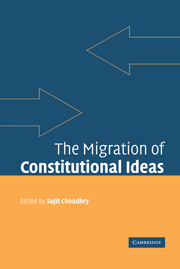Book contents
- Frontmatter
- Contents
- List of contributors
- Acknowledgements
- 1 Migration as a new metaphor in comparative constitutional law
- PART I The methodology of comparativism
- PART II Convergence toward a liberal democratic model?
- 5 Questioning the migration of constitutional ideas: rights, constitutionalism and the limits of convergence
- 6 Spreading liberal constitutionalism: an inquiry into the fate of free speech rights in new democracies
- 7 Underlying principles and the migration of reasoning templates: a trans-systemic reading of the Quebec Secession Reference
- 8 Migrating marriages and comparative constitutionalism
- PART III Comparative constitutional law, international law and transnational governance
- PART IV Comparative constitutional law in action – constitutionalism post 9/11
- Index
5 - Questioning the migration of constitutional ideas: rights, constitutionalism and the limits of convergence
Published online by Cambridge University Press: 25 July 2009
- Frontmatter
- Contents
- List of contributors
- Acknowledgements
- 1 Migration as a new metaphor in comparative constitutional law
- PART I The methodology of comparativism
- PART II Convergence toward a liberal democratic model?
- 5 Questioning the migration of constitutional ideas: rights, constitutionalism and the limits of convergence
- 6 Spreading liberal constitutionalism: an inquiry into the fate of free speech rights in new democracies
- 7 Underlying principles and the migration of reasoning templates: a trans-systemic reading of the Quebec Secession Reference
- 8 Migrating marriages and comparative constitutionalism
- PART III Comparative constitutional law, international law and transnational governance
- PART IV Comparative constitutional law in action – constitutionalism post 9/11
- Index
Summary
Introduction
It is widely accepted that the migration of constitutional ideas through judicial borrowings has facilitated the emergence, in a variety of jurisdictions, of a common liberal democratic model of constitutionalism. In her contribution to this volume, for example, Lorraine Weinrib describes a postwar constitutional paradigm or model that is produced by the cross-fertilisation of ideas from many jurisdictions. In her account, this new paradigm is characterised mainly by the method that judges use to determine the validity of laws alleged to infringe constitutionally guaranteed rights. Starting from the premise that these rights are never absolute, this method involves determining whether a law does infringe a right, and, if so, whether it is consistent with the rule of law, and justified by its pursuit of a sufficiently important objective in a rational and proportional fashion, consistently with deeper principles of equality and dignity.
I believe that the phenomenon of judicial borrowing, in the service of an emerging cosmopolitan model of constitutionalism, goes much further than this. Weinrib is concerned with constitutions that explicitly protect rights but permit them to be restricted in some cases. Within that framework, some method is needed to determine the scope of the rights and the validity of restrictions imposed on them, and judicial borrowings have helped courts develop a sensible method. For reasons I will mention later, none of this strikes me as very controversial. I will discuss, instead, judicial borrowings that go far beyond the methodology used to interpret and apply existing rights.
- Type
- Chapter
- Information
- The Migration of Constitutional Ideas , pp. 115 - 141Publisher: Cambridge University PressPrint publication year: 2007
- 3
- Cited by



